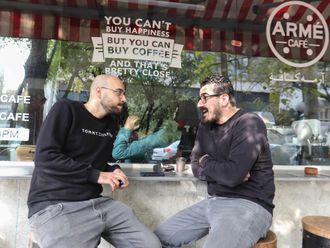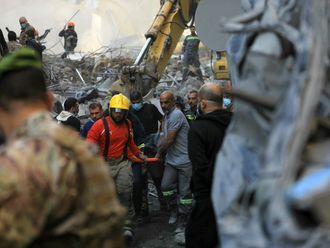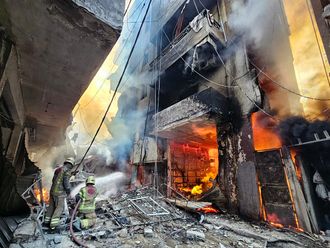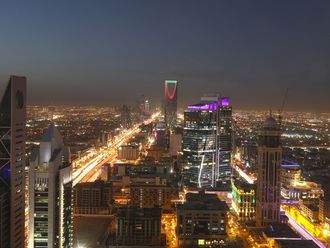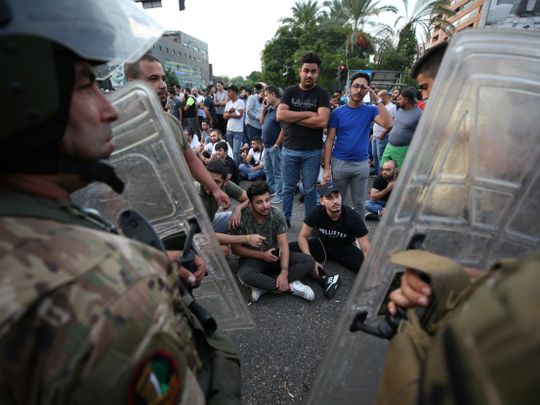
Dubai: Nationwide protests paralyzed Lebanon on Friday as demonstrators blocked major roads in a second day of rallies against the government's management of a severe economic crisis and proposed new taxes.
The protests were the largest since 2015, and could further destabilize a country with one of the highest debt loads in the world.
The protests could plunge Lebanon into a political crisis with unpredictable repercussions for the economy, which has been in steady decline. Some of the protesters said they would stay in the streets until the government resigns.
Schools, banks and businesses shut down as the protests escalated and widened in scope to reach almost every city and province.
Hundreds of people burned tires on highways and intersections in suburbs of the capital, Beirut, and in northern and southern cities, sending up clouds of black smoke in scattered protests. The road to Beirut's international airport was blocked.
On Thursday, throngs of people converged near the government headquarters in downtown Beirut, in one of the largest such demonstrations in years, calling on politicians currently debating a proposed austerity budget to step down and hold early elections.
After a night of fury, fires were still burning in some rock-covered streets and new protests broke out in the north.
“The people want the fall of the regime,” protesters gathered in central Beirut chanted. Others shouted: “ thieves, thieves.”
Why are Lebanese protesting?
Citizens are angry over plans to impose a levy on WhatsApp calls.
On Thursday, the minister of information announced plans by the cabinet to enforce a 20-cents-per-day fee for Internet phone calls, including on WhatsApp and Facebook.
He also revealed a proposal to be discussed by ministers to raise value-added tax to 15 percent by 2022.
Lebanon has seen a wave of protests recently, driven by dire economic conditions made worse by the country’s financial crisis.
It is one of the most heavily indebted countries in the world, and recently the government declared a state of economic emergency. The government says it is seeking ways to fight deficit, but meanwhile, the country’s currency, pegged against the dollar, remains under pressure.
The proposed Internet-phone fee, seen as a new revenue stream, was revoked after the protests. But it was not enough to appease the protesters.
What is the state of Lebanon’s economy?
The economic stakes have rarely been higher for Lebanon, a tiny country that straddles the geopolitical fault-lines of the Middle East, since the end of the 15-year civil war in 1990.
One of the most indebted countries in the world, it is struggling to find fresh sources of funding as the foreign inflows on which it has traditionally relied have dried up.
Promises of assistance from Saudi Arabia and Qatar, which has pulled Lebanon back from the brink in previous crises, has failed to materialize.
Expatriate Lebanese, long a backbone of the economy, are remitting less money as confidence in the government’s financial management plummets.
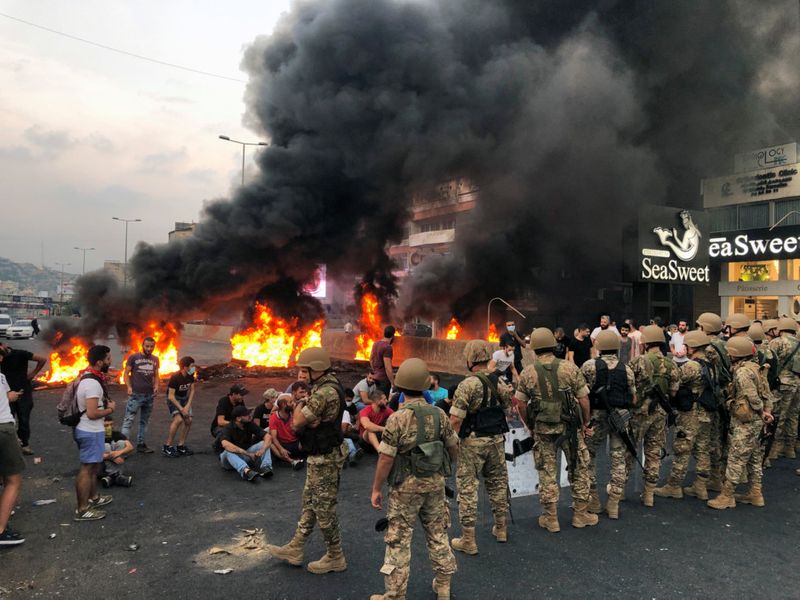
The International Monetary Fund projects Lebanon’s current-account deficit will reach almost 30% of gross domestic product by the end of this year.
As violence flared, it issued a new report predicting that economic growth, stagnant at 0.3% in 2018, would continue to be weak amid political and economic uncertainty and a severe contraction in the real estate sector.
What do citizens say?
“We came down here because we want to bring down this corrupt regime that has been burning us for over 50 years, before they even burned the trees,” said a 26-year-old accountant who identified himself as Kareem.
Kareem was refering to a devastating string of blazes that ripped through Lebanon’s mountains earlier this week.
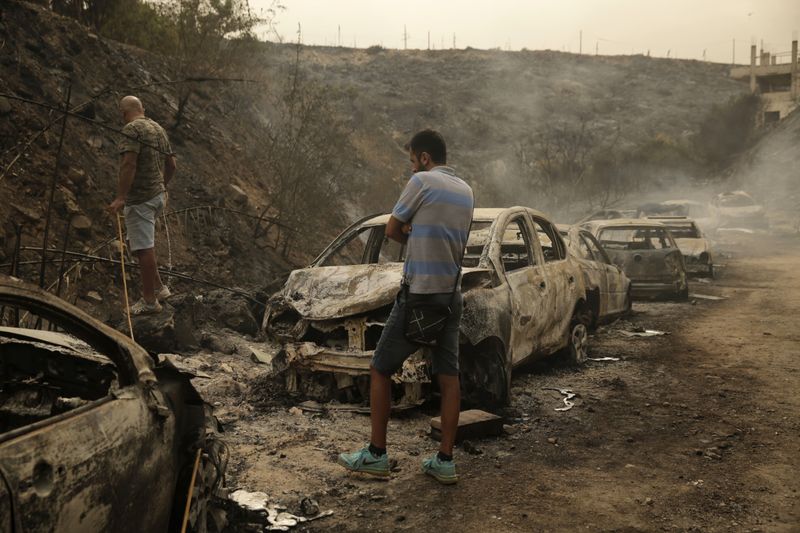
“We shouldn’t have to depend on Cyprus or Turkey or Iran or Hezbollah,” he said, referring to Cyprus sending helicopters to help with the fire.
“Nothing is going to change until the whole country protests.”
“I haven’t had a job in three years,” said Abed, a 40-year-old construction worker who said he blames everyone in the government.
The country is burning. They’re burning our country, they’re burning our trees. We don’t even have a helicopter that can put out fires. We paid $15 million for them to park them aside.
“The country is burning,” his friend Mohammed, 31, said. “They’re burning our country, they’re burning our trees. We don’t even have a helicopter that can put out fires. We paid $15 million for them to park them aside.”
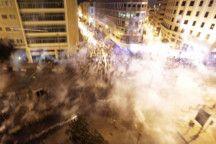
His voice shaking with anger, Mohammed continued: “We don’t have water. We don’t have tourism. Our beaches are abandoned, stolen, looted.”
He listed the names of the country’s prominent politicians: Prime Minister Saad Hariri, parliamentary Speaker Nabih Berri and Nasrallah. “These are all thieves that need to be in jail as soon as possible.”
How have politicians reacted?
Walid Jumblatt, the main leader of Lebanon’s Druze sect, told a Lebanese TV channel after the protests that he spoke to Hariri and told him that they were in trouble. “I prefer we leave and quit together,” he told the LBC channel.
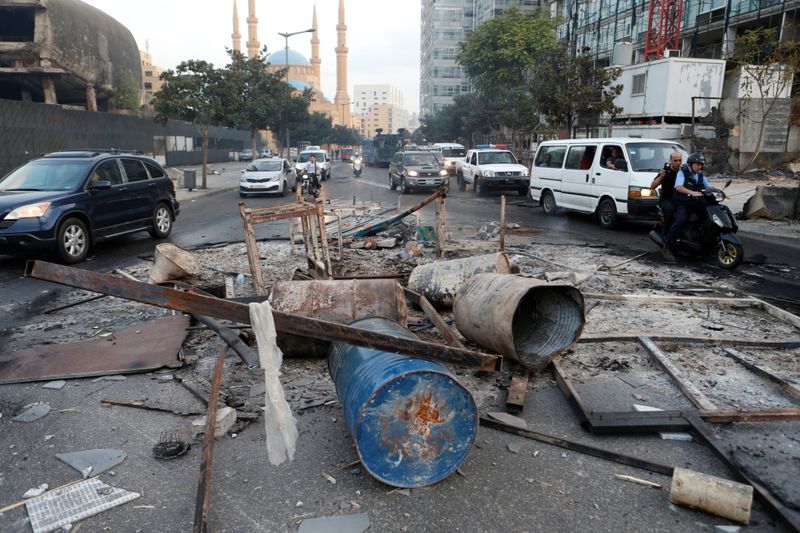
Interior Minister Raya al-Hassan said the prime minister has not made a decision, adding that he would speak later on Friday.
“If the government falls, any other government that follows will not have better options than the ones in front of the current government,” she told a local news channel. “Changing the government is not a solution, and if it fell then collapse will be inevitable.”
-With inputs from agencies


